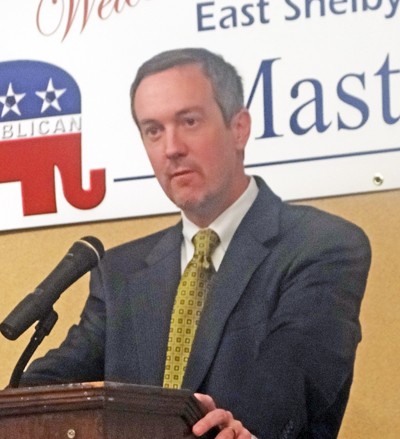Those readers of even moderate faculties of memory will recall a pair of legal set-tos last year pitting the Shelby County Election Commission against plaintiffs who were charging either disproportionate voting processes favoring suburbanites or outright voter suppression. Both issues were decided in favor of the plaintiffs, against suppression, and for the maximum possible enabling of the voting franchise.
 JB
JB
Tennessee Secretary of State Tre Hargett
The sad fact is — regarding this, as on a whole panoply of other matters — state government is attempting to intervene against the results of decision-making at the local level (in this case, against decisions in Shelby County Chancery Court). A bill backed by Tennessee Secretary of State Tre Hargett and state Election Coordinator Mark Goins would not only penalize new-voter applications that are incomplete but would hold individuals and organizations responsible for helping turn them in via voter registration drives, saddling those individuals and organizations with fines of up to $8,000.
This issue of incomplete ballots, of course, was the one adjudicated last year in the courtroom of Chancellor JoeDae L. Jenkins, who directed the Election Commission, which had thrown out various incomplete applications, to extend its deadlines long enough to allow those applications to be completed and/or amended.
Democratic members of the General Assembly held a press conference at the Capitol on Tuesday to protest the measure (House Bill 1079/Senate Bill 971), which is pending this week in both the House and the Senate. They were backed up by representatives of the Tennessee Equity Alliance and the Black Voter Project. State Representative John Ray Clemmons (D-Nashville) went through a brief history of prior voter suppressions, including the photo ID law and the prohibition of college IDs in connection with it. He said, “Ask Tre Hargett and ask Mark Goins what they’re afraid of? Black students? Brown students?”
Another Nashville Democrat, Vincent Dixie, followed that up: “If they’re not afraid of competition, why are they afraid to let people vote? What is this legislation really addressing?”
Those two were followed by state Senator Brenda Gilmore (D-Nashville), who provided the interesting (and alarming) fact that, in the interval since Tennessee’s adoption of the Voter ID law, the state had fallen from number 27 in its ratio of voter turnout to dead last. And finally Representative Bob Freeman (D-Nashville) issued the compelling truism: “We don’t need to do anything to rebut people’s right to vote.”
It remains to be seen, of course, if the Republican supermajority that controls the General Assembly can be brought to re-examine its premises. And even if the bill should pass muster in both chambers this week, there would remain the hope that Governor Bill Lee, who is capable of common sense and compassion despite his ever more obvious conservatism, could issue a veto.
And, if worse should come to worst legislatively, there are always the courts — and the hope that the judgment of Chancellor Jenkins can be replicated on a statewide scale.